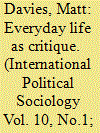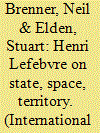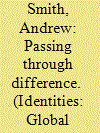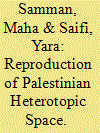|
|
|
Sort Order |
|
|
|
Items / Page
|
|
|
|
|
|
|
| Srl | Item |
| 1 |
ID:
145112


|
|
|
|
|
| Summary/Abstract |
This article argues that critical International Political Economy (IPE) has used an undertheorized notion of everyday life and that Henri Lefebvre’s approach to everyday life, when augmented by attending to specifically colonial modes of domination, provides a necessary theoretical basis for IPE to engage with the everyday. It thus explores the connections between critical IPE, the critique of everyday life, and postcolonial thought. It begins by examining the “turn” to the everyday in IPE, examining the consequences of its reliance on an untheorized notion of the everyday. Lefebvre’s critique of everyday life is then examined to address these shortcomings. But Lefebvre’s provocation about the colonization of the everyday also requires greater conceptual clarity. Thus, the article goes on to examine the affinities between postcolonial thought and the critique of everyday life. This underscores the indispensability of Lefebvre’s critique in terms both of everyday life and of the international as constituted by colonization.
|
|
|
|
|
|
|
|
|
|
|
|
|
|
|
|
| 2 |
ID:
092294


|
|
|
|
|
| Publication |
2009.
|
| Summary/Abstract |
In this article, we offer an account of how the French Marxist philosopher and sociologist Henri Lefebvre can be read as a theorist of territory. While Lefebvre's writings on state space have generated some interest in recent years, the territorial dimensions of his thinking on this issue have not been explored. Meanwhile, the question of territory has been oddly undertheorized in the post-1970s literatures on international relations and spatialized political economy. Against this background, we suggest that Lefebvre's work contains some insightful, if unsystematic, observations on the relationship between states, space and territory. Following consideration of Agnew's (1994) influential injunction that social scientists transcend the "territorial trap," we develop this reading of Lefebvre with reference to three key dimensions of his approach to state space as territory-first, the production of territory; second, state territorial strategies; and third, the "territory effect," namely, the state's tendency, through its territorial form, to naturalize its own transformative effects on sociospatial relations. Thus construed, Lefebvre's approach productively raises the issue of how the territorial trap is actually constructed and reproduced.
|
|
|
|
|
|
|
|
|
|
|
|
|
|
|
|
| 3 |
ID:
174038


|
|
|
|
|
| Summary/Abstract |
This essay offers a comparative analysis of the work of Henri Lefebvre and C.L.R. James, both key contributors to the emergence of a humanist form of Marxism in the twentieth century. Independently of each other, both writers, I show, developed a mode of critique which emphasised capitalism’s dehumanizing social effects, and which rejected a merely instrumental or utilitarian political response. Consequently, both writers placed critical emphasis on those longings and demands made evident in the insurgent politics of everyday life and popular culture; in what both conceptualised as a search for ‘happiness‘. But at the same time, the comparison is important because it makes evident the extent of the divisive intellectual legacies of empire within European Marxism. Lefebvre’s work bears in itself the marks of a racialised understanding of human relations; the ’human’ of which he speaks is limited in ways that James challenged consistently.
|
|
|
|
|
|
|
|
|
|
|
|
|
|
|
|
| 4 |
ID:
186983


|
|
|
|
|
| Summary/Abstract |
This article was written during the first wave of the COVID-19 pandemic in East Jerusalem between March and June 2020. It discusses how the Palestinians approached the pandemic within the context of occupation, and how they used their power to reproduce what Henri Lefebvre called heterotopic spaces. People articulated these spaces accumulatively as they sought meaning in their daily lives, while managing the pandemic and benefitting from their previous experiences during their struggle against Israeli occupation. Thus, the aim is to shed light on the evolving role of civil society to support local action in dealing with a pandemic and to understand COVID-19 from peoples’ perspective rather than from a top-bottom lens in occupied cities. The methodology is multilayered: We use theoretical concepts of heterotopic spaces and analyze them through the social/societal, the temporal/historical, and the spatial/geographical forms of knowledge borrowed from Michel Foucault, Henri Lefebvre, and Edward Soja. It also builds on participant observation, official and media sources, and semi-structured interviews conducted with heads of committees of the Jerusalem Cluster community initiative. Accordingly, the study illustrates how the voices of the people become more significant in taking a leading role in a pandemic crisis in an occupied city.
|
|
|
|
|
|
|
|
|
|
|
|
|
|
|
|
|
|
|
|
|